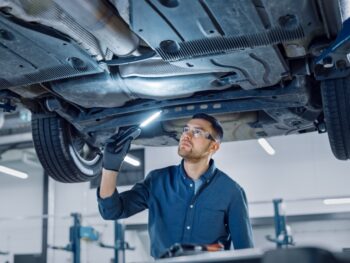Record vehicle service and repair complaints to ombudsman
The number of vehicle service and repair complaints made to The Motor Ombudsman has hit a new high for Q3 amid the continued strain on motorist finances.

Q3 complaints were up 18% from Q3 2023
Between the start of July and end of September 2024, consumers made 1,586 new complaint;, up nearly a fifth (18%) from 1,348 in Q3 2023.
This was slightly off the all-time high of 1,657 service and repair cases logged in the second quarter of this year, but underscores the general trend in rising vehicle service and repair cases.
This is reflected by the fact that cases for the opening three-quarters of 2024 rose 29% from the same period in 2023 (4,847 versus 3,763).
The majority of complaints in Q3 were for the drivetrain, accounting for nearly 40% of cases; down from 51% in Q3 2023. Issues raised by consumers included faulty timing chains snapping prematurely and causing shaking at higher speeds, turbo failures and excessive oil consumption.
Chief ombudsman and managing director Bill Fennell said: “With the car parc being predominantly petrol and diesel models, the drivetrain area of a vehicle continues to generate the highest volume of service and repair complaints, but this will no doubt see a shift once EV sales become more prominent in the run-up to 2030.”
Next up was the level of customer service, which accounted for just under a third of complaints (32%) – higher than the figure of 17% reported at the same time last year. Cases included businesses damaging vehicles and individual components whilst on the ramp, and repairers carrying out work without the authorisation of customers. Vehicle owners also logged complaints about repairs not being undertaken following upfront payments, and multiple attempts not rectifying the reported faults.
The third largest source of complaints reported in the third quarter of 2024 related to suspension, brakes, wheels and steering, which stood at 9% of overall complaints, down slightly on the 11% in the July to September period last year.
And almost one in 10 (8%) of complaints were for electrical systems. Faults included alarm wiring corroding, interior fans draining car batteries, erroneous stop/start systems and flickering headlamps. Charging and battery issues equally drove electric vehicle owners to log a complaint in the third quarter, although these were in a minority due to the comparatively lower car parc versus petrol and diesel models.
Across the service and repair complaints made to the ombudsman in Q3, the majority (48%) related to owners of diesel cars, followed by petrol models (43%), electric vehicles (5%) and hybrids (4%).
The three most preferred resolutions were a free-of-charge repair (stated by 31% of respondents), compensation (23%) and a full refund (19%).
Bill Fennell added: “With the rising costs of maintaining and operating a vehicle, coupled with the broader financial pressures on households, consumers are more likely to raise a complaint to help recoup any detriment that they may have considered to have suffered, and are submitting far more detailed and comprehensive evidence to bolster their case.”














